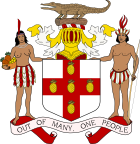 |
|---|
The Farmers' Party was a political party in Jamaica. It contested national elections in 1955, receiving 3% of the vote, but failed to win a seat. [1] It did not contest any further national elections. [2]
 |
|---|
The Farmers' Party was a political party in Jamaica. It contested national elections in 1955, receiving 3% of the vote, but failed to win a seat. [1] It did not contest any further national elections. [2]

The Social Democratic Party of Albania is a minor social-democratic political party in Albania. Its founder is Skënder Gjinushi, a former Minister of Education (1987–1991) and Speaker of Parliament (1997–2001).
The Greens of Andorra is a green political party in Andorra.
The Jamaica Democratic Party was a political party in Jamaica. It contested national elections in 1944 when it received 4.0% of the vote, but failed to win a seat. It did not contest any further elections.
The Republican Party was a political party in Jamaica. It first contested national elections in 1955, but received only 108 votes and failed to win a seat. It did not take part in elections in 1959 or 1962, but returned for the 1967 elections, in which it received only 45 votes. After failing to participate in the 1972, 1976 and 1980 elections it contested the 1983 elections, but received only 257 votes, again failing to win a seat. It did not contest any further elections.

The Independent Labour Party was a political party in Jamaica. It first contested national elections in 1959, but received only 0.8% of the vote and failed to win a seat. It did not contest any further elections.
The Jamaica United Party was a political party in Jamaica. It first contested national elections in 1967, but received only 163 votes and failed to win a seat. It did not contest any further elections.
The Christian Democratic Party was a political party in Jamaica. It first contested national elections in 1972, but received only 109 votes and failed to win a seat. It did not contest any further elections.
The Christian Conscience Movement was a political party in Jamaica. It first contested national elections in 1983. The elections that year saw a mass boycott as the People's National Party protested against the government. The CCM received only 704 votes, which amounted to 2.7% of the total, and failed to win a seat. It did not contest any further elections.

The Convention Independent Party was a political party in Jamaica. It first contested national elections in 1959, when it received fewer than 305 votes and failed to win a seat. It did not contest any further elections.

The African National Congress was a political party in Trinidad and Tobago. The party first contested national elections in 1961, when it received just 0.5% of the vote and failed to win a seat. They did not put forward any candidates for the 1966 elections, but returned for the 1971 elections, in which the party received 2% of the vote, but again failed to win a seat as the People's National Movement won all 36. The party did not contest any further national elections.
The Caribbean National Labour Party was a political party in Trinidad and Tobago. It contested the 1956 general elections, but failed to win a seat. The party did not contest any further elections.
The National Trinidad and Tobago Party was a political party in Trinidad and Tobago. It contested the 1976 general elections, but received just 115 votes and failed to win a seat. It did not contest any further elections.

The National Freedom Party was a political party in Trinidad and Tobago. It contested the 1981 general elections, but received just 864 votes and failed to win a seat. The party did not contest any further elections.
The Movement for Unity and Progress was a political party in Trinidad and Tobago founded by Hulsie Bhaggan. It contested the 1995 general elections, but received just 0.4% of the national vote and failed to win a seat. The party did not contest any further national elections.
The National Transformation Party was a political party in Trinidad and Tobago. It contested the 1995 general elections, but received just 83 votes and failed to win a seat. The party did not contest any further elections.
The National Law Party was a political party in Trinidad and Tobago. It contested the 1995 general elections, but received just 0.3% of the national vote and failed to win a seat. The party did not contest any further elections.

The German-National Party was a political party in Austria.
The Tenants' Union was a political party in Estonia.

The Democratic Party was a political party in Macedonia.
The Agrarian Union Party was a political party in Romania.